
Galapagos park testing coral replanting to restore fragile ecosystem
(Reuters) - Ecuador's Galapagos National Park is testing different coral replanting methods in an effort to restore fragile underwater ecosystems around the storied islands.
Coral reef die-offs affect the marine food supply chain and are considered a major climate tipping point.
The experimental project is run by park rangers and volunteers, with support from the Galapagos Conservancy, in a bay on Santa Cruz island.

A metal frame with pieces of coral is pictured after it was put into the sea by park rangers and volunteers following tests that have shown that coral reproduces when placed on varying surfaces or strung on frames, in Santa Cruz, Galapagos Islands, Ecuador August 30, 2022. (Galapagos National Park/Handout via REUTERS)
Since 2020 they have tested how coral reproduces when it is placed on varying surfaces like bricks, cement or tied together and strung on metal frames, growing samples in a nursery before adding them to the bay.
"The area around the nursery has seen improvements with the presence of the coral, with the appearance of new fish and invertebrates," said Jenifer Suarez, the park ranger who leads the project.
Related: Seagrass 'Neptune balls’ trap millions of plastics from the ocean, study finds
Climate events associated with the El Nino phenomenon - which increases sea temperature around the Galapagos - have pushed corals in the archipelago nearly to extinction, said Danny Rueda, head of Galapagos park.
This project "will regenerate areas of great ecological value in the Galapagos marine reserve to benefit its ecosystems and local productive sectors," he said.
(Reporting by Tito Correa; Writing by Julia Symmes Cobb; Editing by Aurora Ellis)
Thumbnail image: Park rangers and volunteers prepare a frame with pieces of coral to be put in the sea following tests that have shown that coral reproduces when placed on varying surfaces or strung on frames, in Santa Cruz, Galapagos Islands, Ecuador May 25, 2022. (Galapagos National Park/Handout via REUTERS)










